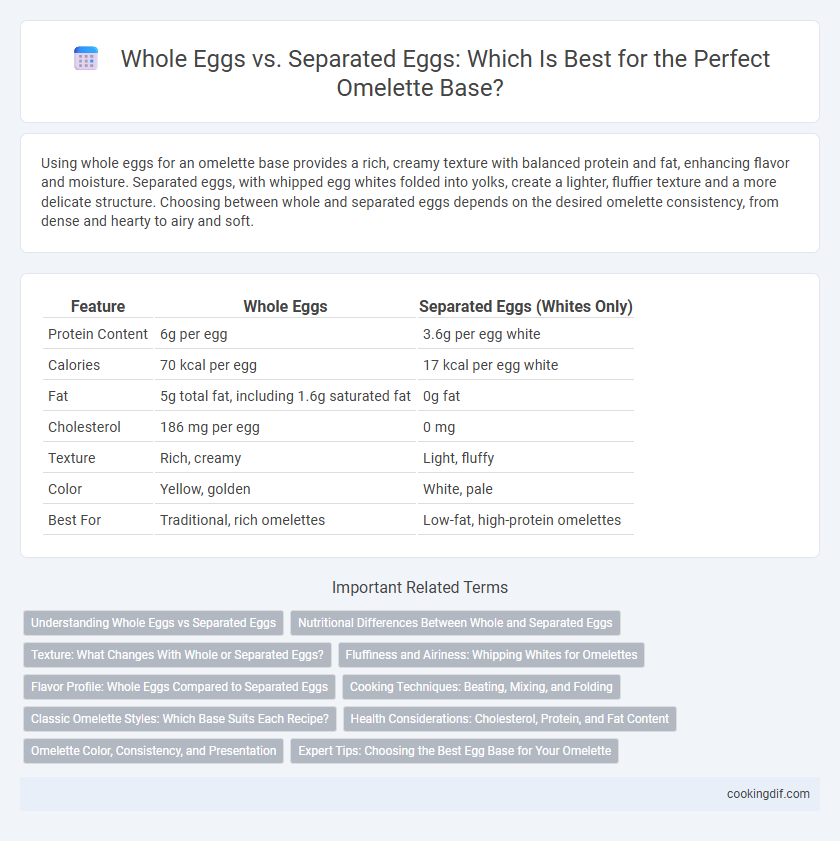Using whole eggs for an omelette base provides a rich, creamy texture with balanced protein and fat, enhancing flavor and moisture. Separated eggs, with whipped egg whites folded into yolks, create a lighter, fluffier texture and a more delicate structure. Choosing between whole and separated eggs depends on the desired omelette consistency, from dense and hearty to airy and soft.
Table of Comparison
| Feature | Whole Eggs | Separated Eggs (Whites Only) |
|---|---|---|
| Protein Content | 6g per egg | 3.6g per egg white |
| Calories | 70 kcal per egg | 17 kcal per egg white |
| Fat | 5g total fat, including 1.6g saturated fat | 0g fat |
| Cholesterol | 186 mg per egg | 0 mg |
| Texture | Rich, creamy | Light, fluffy |
| Color | Yellow, golden | White, pale |
| Best For | Traditional, rich omelettes | Low-fat, high-protein omelettes |
Understanding Whole Eggs vs Separated Eggs
Whole eggs provide a balanced blend of yolk and white, delivering richer flavor and creamier texture ideal for fluffy omelettes. Separated eggs, using only whites or yolks, allow control over specific nutritional profiles and texture; whites create lighter, protein-rich omelettes while yolks add density and moisture. Selecting between whole and separated eggs depends on dietary preferences, desired consistency, and flavor intensity in omelette preparation.
Nutritional Differences Between Whole and Separated Eggs
Whole eggs provide a balanced combination of protein, healthy fats, vitamins A, D, E, and B12, as well as minerals like iron and selenium, making them a nutrient-dense choice for an omelette base. Separated egg whites offer a leaner option with high-quality protein and minimal calories, fat, and cholesterol, ideal for those seeking heart-healthy or low-fat meals. Choosing between whole eggs and separated egg whites depends on dietary goals, with whole eggs delivering more comprehensive nutrition and egg whites offering a lighter protein source.
Texture: What Changes With Whole or Separated Eggs?
Using whole eggs for an omelette base results in a denser, creamier texture due to the combined presence of yolks and whites, which provide both fat and protein. Separating eggs and whipping the whites before folding them into the yolks creates a lighter, fluffier omelette with increased air incorporation and a more delicate structure. The choice between whole or separated eggs directly impacts the omelette's mouthfeel and structural stability, with whole eggs producing a richer bite and separated eggs offering elevated softness and volume.
Fluffiness and Airiness: Whipping Whites for Omelettes
Whipping egg whites separately before folding them into the yolks creates an omelette with significantly greater fluffiness and airiness compared to using whole eggs alone. The aeration in whipped whites traps more air, resulting in a lighter texture and a delicate rise during cooking. This technique enhances the omelette base by delivering a tender, souffle-like consistency preferred by chefs and culinary experts.
Flavor Profile: Whole Eggs Compared to Separated Eggs
Whole eggs create a richer, creamier omelette with a balanced flavor due to the combined proteins and fats from both yolks and whites. Separated eggs, often whipping egg whites alone, result in a lighter, fluffier texture but can lack the depth and richness contributed by yolks. The yolk's fats enhance umami and mouthfeel, making whole eggs more flavorful than using whites only.
Cooking Techniques: Beating, Mixing, and Folding
Beating whole eggs results in a richer texture due to the combined yolk and white, while separating eggs allows for more control over fluffiness by whipping the whites independently before folding them in. Proper mixing techniques prevent overbeating, which can toughen the omelette, and gentle folding maintains airiness for a light, tender finish. Using these methods optimizes the omelette's texture, balancing creaminess from yolks and volume from whipped whites.
Classic Omelette Styles: Which Base Suits Each Recipe?
Classic French omelettes benefit from whole eggs, providing a smooth, tender texture essential for their delicate folding technique. In contrast, separated eggs--using only egg whites--create a lighter, fluffier base ideal for souffle omelettes and healthier variations. Understanding the role of yolks and whites helps home cooks choose the perfect base for each style, balancing richness and texture in every bite.
Health Considerations: Cholesterol, Protein, and Fat Content
Using whole eggs for an omelette provides a balanced source of protein, healthy fats, and essential nutrients, but it also increases cholesterol intake, which may concern individuals with heart health issues. Separated eggs, particularly using egg whites only, offer a low-fat, low-cholesterol alternative while delivering high-quality protein, beneficial for muscle maintenance and overall health. Choosing between whole and separated eggs depends on individual dietary needs, with egg whites favored for reducing fat and cholesterol, and whole eggs preferred for a fuller nutrient profile.
Omelette Color, Consistency, and Presentation
Using whole eggs for an omelette base yields a richer yellow color and a balanced consistency, combining the creaminess of yolks with the lightness of whites. Separated eggs, especially when whipped egg whites are folded in, create a fluffier texture and a paler, more delicate appearance that enhances presentation. The choice between whole and separated eggs directly affects the omelette's visual appeal, mouthfeel, and overall dining experience.
Expert Tips: Choosing the Best Egg Base for Your Omelette
Whole eggs provide a rich, creamy texture and balanced flavor, making them the classic choice for omelettes with a tender and fluffy consistency. Separated eggs, using only egg whites, create a lighter, fluffier omelette with less fat and calories but may lack the richness and depth that yolks contribute. Experts recommend whole eggs for a traditional, nutrient-dense omelette, while egg whites suit those seeking a low-fat, high-protein option without sacrificing volume.
Whole eggs vs separated eggs for omelette base Infographic

 cookingdif.com
cookingdif.com